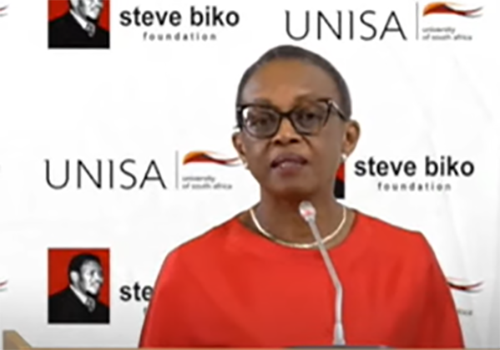News & Events
Covid-19 highlights the need for Africa to be self-reliant
Unisa, in partnership with the Steve Biko Foundation, hosted the 21st Annual Steve Biko Memorial Lecture on Sunday, 12 September 2021. The virtual lecture was delivered by the first female Regional Director of the World Health Organization (WHO), Dr Matshidiso Moeti, WHO Regional Director for Africa.
Moeti is a medical doctor and public health expert, with more than 40 years of national and international experience. She is a great champion for women in leadership in global health, and has launched a partnership with the United Nations (UN) Volunteers Programme to recruit 100 young women from the Global South as the next generation of health leaders. Starting her address, Moeti took time to congratulate Professor Puleng LenkaBula on her appointment as the first woman and first black woman appointed as Unisa Principal and Vice-Chancellor.

Dr Matshidiso Moeti, WHO Regional Director
A need for self-reliance
Significantly, the date of the lecture marked the 44th commemoration of the murder in detention of Bantu Stephen Biko. Moeti premised her lecture on the need for Africa to be self-reliant. Denoting the vaccine shortage experience in African countries specifically, Moeti said that there is an urgent need for global assistance in getting vaccinations to African countries.
Moeti further argued that the shortages and poor logistical arrangements in vaccine distribution in African countries are clear illustrations of Africa’s poor investment in healthcare. She warned that the Covid-19 pandemic has highlighted a need for Africa to be self-reliant and for its citizens to hold their governments accountable.
“Covid-19 should be a wake-up call to transform our society and systems, and build a world that is guided by equity and self-reliance,” she said. Self-reliance, according to Moeti, is crucial because if there is another pandemic, it would be in Africa’s best interest to be much more prepared than the continent was in the face of the Covid-19 pandemic.
In her argument, Moeti said that billions of dollars are lost in Africa every year owing to poor governance and corruption by governments. “To redress this challenge,” she said, “citizens have to take the responsibility of holding the governments they vote into power to account for maladministration and corruption which impacts the lives of ordinary citizens. A compact is needed; individuals need to know, believe and have the capacity to play their part. But they also need to trust their government and ensure it is enabled, honest, and committed to play its part.”
Moeti continued to argue that during this pandemic, the principles that Steve Biko embodied in his dialogue with South Africa and the rest of the world, which were guided by his actions, have proven central to action across all countries during the pandemic and beyond. She said: “Fifty years from the conference on the development of the African community which called for the promotion of Black Consciousness, the pandemic has shone a spotlight on enduring challenges of inequity and injustice. There is a need for sustainable development in Africa.”
Way forward
Moeti said the pandemic has highlighted the poor investment in Africa’s health care and its systems. She said: “Across Africa, Covid-19 has highlighted failures to invest in health systems. Once the disturbing images of mass burials and the drama of the outbreak are over, investment in building resilient health systems and societies should take off in order for the continent to be better prepared for the next threat.”
She concluded: “Covid-19 will not be the last threat to our collective humanity, but it should be a wake-up call to transform our systems and societies. Together it is our responsibility to seize this moment to build a world where our connectedness and shared fate are guided by equity, justice, and self-reliance.”
*By Tshimangadzo Mphaphuli, Senior Journalist, Department of Institutional Advancement
Publish date: 2021-09-13 00:00:00.0

